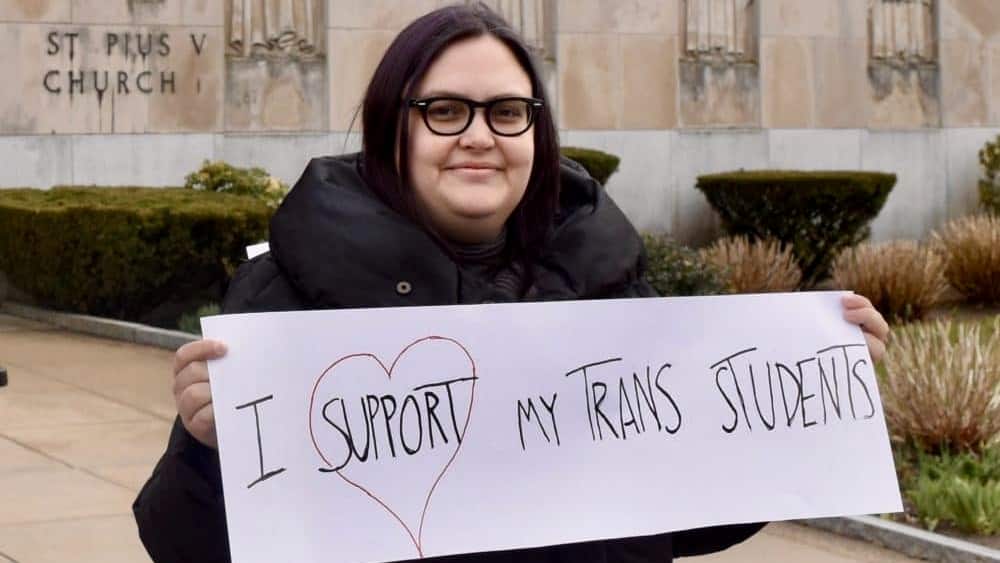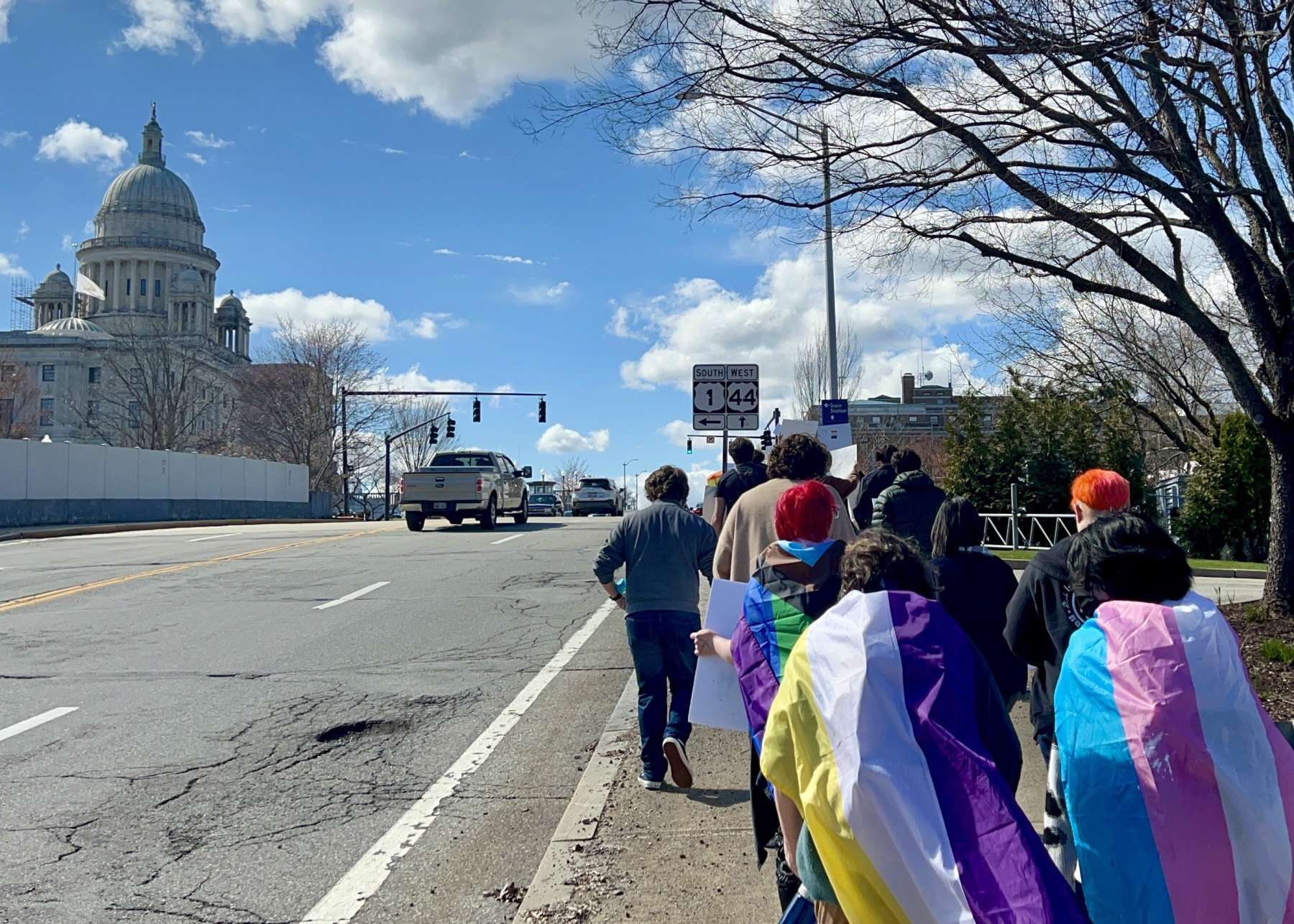Oped: Visibility isn’t enough to liberate trans communities
“More than anything, I want to see trans youth become adults,” writes V Tran.
March 30, 2022, 12:31 pm
By V Tran
I’m not sure how to untether the allure of trans visibility from its lethal consequences.
Rachel Crandall founded Trans Day of Visibility in 2009, citing her anger that the only other day recognizing trans people was Trans Day of Remembrance, which Gwendolyn Ann Smith founded in 1999 to honor and memorialize those whose lives were lost in acts of anti-trans violence. When it comes to visibility and violence, one begets the other.
In the first three months of 2022, state lawmakers across the United States introduced over 140 anti-trans bills, including S2501 and H7539 in Rhode Island. Bills targeting trans youth have gained momentum this year, especially in Republican-led state legislatures. 2022 will surpass 2021 in the national total of anti-trans bills, frequently framed as “unprecedented legislative assaults”. But efforts to exclude trans people from public life are anything but new.
The copycat anti-trans bills pervading the country are a coordinated effort driven by far-right and conservative lobbyist groups, the likes of which launched costly campaigns against same-sex marriage. Designed to intimidate and spark outrage, these proposed laws stoke moral panics that have restricted the autonomy of trans youth as early as the 1930s.
Compared to other states, Rhode Island has more robust protections for trans individuals. In 2001, Rhode Island became the second state to codify civil rights protections for trans people. In 2016, the RI Department of Education issued guidance outlining protections for trans students. The RI Interscholastic League, which runs and regulates high school sports in the state, expressly allows trans athletes to participate in programs “consistent with their gender identity.”
While the strides in equal rights achieved by Rhode Island offer some protection, policies alone do not preclude discrimination or violence against trans people. Anti-trans bills are harmful even if they don’t advance or become law, especially when half the battle is weaponizing visibility against trans people.

Anti-trans bills harm trans youth even if they don’t become law
We know that public debate about the rights of trans people has negative impacts on mental health. Public officials justify transphobic laws by falsely claiming that they “protect children”, but the mere introduction of these bills is having severe tolls on the mental health of trans youth.
These legislative attacks are the latest iteration of “think of the children!” moral panics. The exclusion and mistreatment of trans, non-binary, and gender-expansive youth in schools remains persistent while the media fixates on a debate about their basic rights. The Centers for Disease Control notes that 35% of trans youth have attempted suicide and the US National Trans Survey reveals that 78% of respondents reported harassment in grades K-12.
As I watch public hearings on anti-trans bills in other states, I admire the conviction of trans youth who deliver testimony before the public eye. I still can’t help but feel afraid for them. No amount of bravery can prepare a child for the scrutiny of magnified press coverage, a cycle pedaled by deceptive soundbites and video clips tailored for reaction.

Hypervisibility can endanger trans people
In an interview, trans elder Miss Major Griffin-Gracey – a veteran of the Stonewall Rebellion in 1969 and the Attica Prison Uprising in 1971 – connects violence against trans people as a reaction to trans visibility: “Another trans woman pays the price for what the media is applauding.”
Trans visibility is double-edged. Some might point to visibility as a way to “normalize” trans people’s presence in public life. Time Magazine’s 2014 cover story, “The Transgender Tipping Point”, quotes actress Laverne Cox: “When people have points of reference that are humanizing, that demystifies difference.”
At the same time, trans visibility can be fraught with tremendous risk. Media coverage about trans people is too often accompanied by backlash, disinformation, and harassment. Hypervisibility for Black trans women and trans women of color has especially devastating consequences.
President Joe Biden’s proclamation on Trans Day of Visibility in 2021 acknowledged that the “crisis of violence against transgender women, especially transgender women of color, is a stain on our Nation’s conscience.” While a starkly more empathetic response compared to the previous administration, this sentiment of recognition isn’t enough to materially support and protect trans people.

Who protects us when our systems don’t?
When public officials invoke historic trans women of color trailblazers like Marsha P. Johnson and Sylvia Rivera for their roles in the Stonewall Riots, these statements often ring hollow. We cannot applaud the spectacle of trans inclusion while paying dust to trans individuals most vulnerable to violence. Without eliminating the systematic barriers that shaped these women’s lives in decades following the uprising, what are we actually celebrating?
These institutional failures compelled Johnson and Rivera in 1970 to found STAR House, a run-down apartment providing shelter for homeless gay, trans, and gender non-conforming youth. Rivera, in an interview with revolutionary Leslie Feinberg, describes how she sustained STAR House during the one year it was active: “We fed people and clothed people. We kept the building going. We went out and hustled the streets. We paid the rent. We didn’t want the kids out in the streets hustling.”
STAR House demonstrates how when systems fail us, communities move mountains to support each other through mutual aid. We can see this in local initiatives that emerged during the COVID-19 pandemic, such as community fridges maintained by PVD Community Fridge and Refri PVD, and direct mutual aid funds like Queer + Trans Mutual Aid PVD and Ocean State A$$ Mutual Aid Fund.
Community members in Rhode Island are charting innovative solutions that aim to defeat homelessness and housing insecurity, which has intensified for trans people through the pandemic. PrYSM is developing its Rapid Emergency Shelter Team, a community-based queer re-housing network currently hosting info sessions for potential hosts. Haus of Codec, which hosts monthly LGBTQQIA+ Art Market and Resource Fairs, opened Providence’s first emergency youth shelter in 2021.

Rethinking how we identify “trans issues”
It doesn’t escape me that Johnson, Rivera, and the people they cared for experienced material realities that resemble those of the most vulnerable trans people today – individuals who face homelessness, hostility in the formal economy, challenges with substance use, abysmal access to healthcare, and persistent criminalization.
Violence against trans people is a contradictory dance between hypervisibility and invisibility. Anti-trans bills largely do not contain the word “transgender”, although dog whistles like “pronouns” and “inherent differences” make the targets evident.
Transphobia is imprecise, relying on essentialism and eugenics as a compass to police people deemed “abnormal”. Bathroom bills, intended to prevent trans women from using public restrooms, also have adverse consequences for butch lesbians and any women who others perceive as “masculine”. Further, Derrick Clifton outlines how sports bills build on the legacy of misogynoir aimed at Black women athletes: “Black women in sports — whether they are cis, trans, or intersex — constantly encounter shifting rules and expectations as a reprimand for their successes.”
Policies that could protect trans communities may not always mention us by name either. Last year, Rhode Island’s legislature authorized a two-year pilot program to prevent drug overdoses through harm reduction centers that intend to save numerous lives, including those of trans people.
Trans communities stand to benefit from the decriminalization of sex work proposed by S2713, and the automatic expungement of past cannabis offenses, a crucial amendment if recreational cannabis is legalized through S2430. And if we truly want to protect trans youth, we must heed the repeated calls from youth organizations to remove police in schools.

It’s more than just these anti-trans bills
Even if visibility doesn’t serve me, I can’t escape it. For Trans Day of Visibility this year, I’m challenging myself to recognize what’s not always apparent when transphobia permeates the news cycle.
I can envision kids sitting around dinner tables and the conversations they endure; kids who conceal themselves because of what they would lose; kids who came out and did lose family support; kids who aren’t sure if they will make it to adulthood. I barely did.
After Utah Gov. Spencer Cox broke with his party last week to veto a transgender sports bill, which the Republican legislature would later override, he explained in a statement: “I don’t understand what they are going through or why they feel the way they do. But I want them to live. And all the research shows that even a little acceptance and connection can reduce suicidality significantly.”
I want trans youth to prosper in a world without the psychological attacks waged against those who defy cultural norms of gender. I want trans youth to march on together, to outlive these bills, to swim in abundant opportunities to transform what’s possible for our communities.
We can fight back against anti-trans legislation. But it’s just as critical that we keep creating educational, healthcare, and social service systems through which trans youth, adults, and elders can thrive.
To protect trans people, our allies and accomplices must fight for policies that move away from carceral systems and instead, sustain trans livelihoods through increased access to housing, harm reduction services, and safe employment opportunities.
More than anything, I want to see trans youth become adults.
V Tran is a writer, performance artist, and historian.






